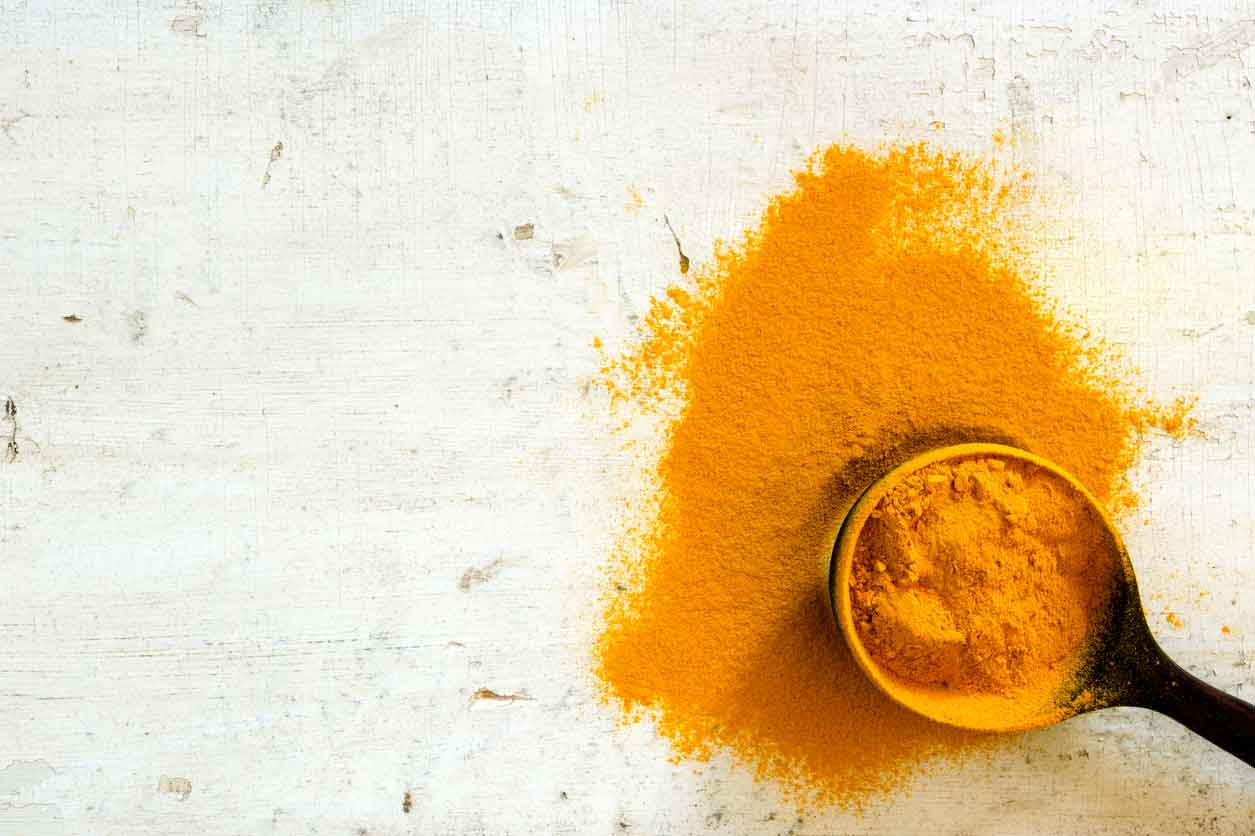The Benefits of Curcumin in Turmeric
A vast amount of scientific research has been done into the many health benefits of turmeric – that golden yellow spice found in many curry powders. A quick PubMed search shows 11,255 papers on curcumin exist.
The plant turmeric (Curcuma longa) is very well known in India. Turmeric is a perennial plant in the ginger family. Its underground roots, or rhizomes, look similar to ginger, but have a browner skin and a bright yellow/orange flesh. The root is harvested, cleaned, dried, and powdered to be used as a spice (turmeric gives curry its beautiful golden yellow colour) and as a medicine. Traditionally, turmeric was used for nearly every health condition known – from smallpox to a sprained ankle.
Turmeric contains vitamin B6, iron, copper, potassium and magnesium and provides small amounts of omega 3 and 6 fatty acids. However its main benefit comes from the polyphenol (plant chemical) Curcumin. Curcumin may be one of the most powerful natural brain protecting substances ever discovered! Just as oranges are a source of vitamin C, turmeric is a source of curcumin. Today, we extract curcumin from turmeric to use as a natural medicine.
Curcumin has been shown to boost immunity, act as a powerful antioxidant and anti inflammatory, support a healthy cardiovascular system, enhance mood, support liver detoxification, support joints, blood, digestion and perhaps most importantly the brain! That’s a lot for one humble spice.
Investigation into the incidence of Alzheimer’s disease around the world revealed that in India, less than 2% of its ageing population suffers from Alzheimer’s, or its close cousin dementia. India has the highest per capita consumption of turmeric AND the lowest incidence of cognitive decline worldwide!
The many compounds present in turmeric help to prevent the beta-amyloid plaque formation in the brain, which is what leads to Alzheimer’s. Turmeric passes easily from the blood into the brain, where it can bind to amyloid plaques that have already formed and assist the body to break them down. It is one of the only known substances to have such a profound effect on the brain.
Curcumin may help to repair damaged nerve cells, partly through its strong antioxidant activity. The brain is packed with nerves and the nerves form the ‘information highway’ of your body. Environmental and dietary toxins may cause problems with our nervous tissue – and curcumin may protect us.
Typically turmeric root contains about 2-5% curcumin, so taking an unstandardised, powdered turmeric root product means that very large amounts would be required to get a beneficial amount of curcumin. Additionally, curcumin is poorly absorbed from the gastrointestinal tract. While turmeric is excellent when used as a spice, a curcumin extract may be a better choice for specific health benefits such as pain relief, reducing inflammation or brain support.
Black pepper can enhance the bio-availability of turmeric. Black pepper added to turmeric in drinks and recipes makes the turmeric more absorbable and potentially more effective.
How to include more turmeric in your diet
- Add turmeric to the water you use to cook rice, quinoa or oats
- Make yourself a nice hot cup of Golden Milk – half a teaspoon of ginger and turmeric powders into a mug of hot water, steep a few minutes then add coconut milk and a little honey. Perfect brain rejuvenating nightcap! I also really like this pre made blend by Gaia herbs, available on Amazon.
- Add 1/2 – 1 teaspoon turmeric powder to soups, stews and any dip that would look good bright yellow, grind in some black pepper.
- Eat more curries, using a mild Indian curry powder that has a higher amount or turmeric to chilli, allowing you to add more curry powder to your recipe.
- Add to a smoothie – yes it goes bright yellow but you can barely taste it with banana or berries in there!
- I recently came across this great hot drink – Turmerlicious, which you can make into a hot chocolate a night. It comes in cocoa, chilli, ginger and vanilla flavours.
- Have a consultation if you feel you may benefit from a therapeutic dose and would like to explore supplementation.


